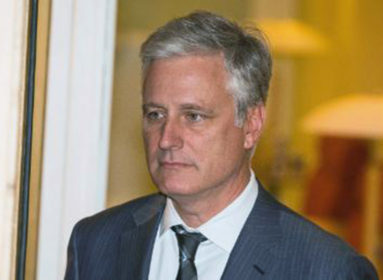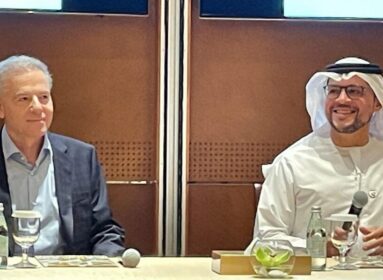
Reviewed by Jack Riemer
 Agree with him or not — like him or not — you must admit that Jacob Neusner is one of the towering figures of 20th century American Jewish scholarship, and that he is unique among Jewish scholars in many ways.
Agree with him or not — like him or not — you must admit that Jacob Neusner is one of the towering figures of 20th century American Jewish scholarship, and that he is unique among Jewish scholars in many ways.
In his recently-released biography Jacob Neusner: An American Jewish Iconoclast, (N.Y.U. Press, 20016), Aaron Hughes describes Neusner as he is — warts and all — and explains the ways in which he has made a significant difference to Jewish life in our time.
Neusner’s first achievement was that, until he came along, it was assumed that if you did not take in Talmud with your mother’s milk and if you had not studied in a yeshiva in your childhood, you could not possibly be a significant scholar of rabbinic Judaism. Neusner, who got a bachelor’s degree from Oscar Handlin in American Jewish History at Harvard, and who studied with Cecil Roth at Oxford, came to the Jewish Theological Seminary with almost no knowledge of Talmud, but he has succeeded in transforming the field. He took the methods of contextualizing a body of literature that he had learned at Harvard, Cambridge, and at Columbia, where he did his doctorate, and applied them to the Talmud. He located the worldview of the Sages within and against the cultures of Roman occupied Palestine and of Persia and Babylonia and gave us a whole new understanding of what the Sages were saying. And, he taught us that the fact that a Sage of the fifth century claims to be quoting a Sage of the first or second century does not prove that it is necessarily so.
For proving that one can come to the study of the Talmud as an adult and still achieve insight and erudition in this field, he deserves our admiration.
His second achievement was challenging the assumptions on which much of the American Jewish community was based. Neusner came to maturity in the 1950s, which was a transitional time for American Jewry in several ways. For one thing, young American Jews had come back from the war and gone to college in greater numbers than ever before, then moved to new communities in suburbia. They were faced with the question of how they should understand themselves in their new locations. Many Jews understood themselves either as obligated to remember and continue Judaism in response to the Holocaust or obligated to serve as spokesmen and supporters of the newborn State of Israel. Without questioning either of these two tasks, Neusner proposed that American Jews could not live vicariously — not as echoes of Eastern Europe and not as front men for the State of Israel. He maintained they had to develop a purpose of their own, one that would be based on serious knowledge of the Jewish tradition.
The second coincidence of timing that occurred in those years was in the academic world. Until then, Judaism was scarcely studied on campus. If it was, it was only the Bible that was taught, as part of the divinity school curriculum. Post-Biblical Judaism was rarely taught, and if it was it was only as a foil to Christianity. Until the post-war period there were only two chairs of Jewish learning in the entire American academic world: Wolfson’s at Harvard and Baron’s at Columbia. But in the ‘50s, there took place an explosion of Jewish studies on campus, and Neusner had a very significant role in training a new generation of scholars to occupy these new positions. Toward that end, Neusner produced a gigantic library of classic Jewish sources in translation. The entire Babylonian Talmud, the entire Palestinian Talmud, most of the Midrash, and many other indispensable books were made available to the general reader by Neusner. As Aaron Hughes puts it: “His is an American Judaism, one that has enabled American Jews — the freest and the best educated Jews in history — to be fully American and fully Jewish.” For this achievement alone, Jacob Neusner deserves the appreciation of us all.
His third achievement was becoming an authentic and an unapologetic spokesman for Judaism in interfaith dialogue. No less a figure than Pope Benedict has hailed his writings and said that he has learned from them. In an age when many so-called dialogues have really simply been two monologues side by side, with each talking at each other instead of listening to each other, Jacob Neusner has modeled how to both speak to and listen to other faiths. For this he has won respect across the lines that separate us from each other.
But Jacob Neusner has also been one of the most controversial figures in all of academic life and in all of modern Jewish life. Hughes portrays in gruesome detail some of the fights involving him that have taken place — such as the attacks on him by Saul Lieberman, Morton Smith, Ephraim Urbach, E. P. Sanders, and many others, and the virtual censorship of him in Israeli scholarship. Some of these disputes are the result of the natural resistance of established scholars to newcomers who offer a different way of seeing things. Some of these disputes are the undeniable result of Jacob Neusner’s intolerance for those who see things differently than he does.
His controversies were not only about scholarly issues. He challenged the concept of affirmative action and believed that it would mean the end of academic excellence on campus. He committed what was considered heresy in the Jewish community at the time by switching from the Democratic Party to the Republican Party because of his stand on affirmative action and other such issues.
And so, after a long stay at Brown University, and then after shorter stays at Bard and the University of Central Florida, Jacob Neusner now lives in retirement, appreciated by his many, many disciples, and ignored or opposed by his many, many opponents.
This is a thoroughly honest and a very well-written biography, and it deserves to be read by both Jacob Neusner’s admirers and by his detractors, for it tells the story of a man who believes in the truth and who seeks it out wherever it can be found, and who has told us what he felt needed to be told, regardless of whether we want to hear it or not.
Jacob Neusner is one of the few scholars who has made a profound difference in how we understand both the Jewish past and the Jewish present, and therefore this book is a valuable and a much needed contribution to us all.
Neusner’s Connecticut connection
Jacob Neusner is the son of Samuel Neusner, who co-founded the Connecticut Jewish Ledger in 1929 and served as its editor until his retirement in 1954. In 2014, on the occasion of the newspaper’s 85th anniversary, Jacob Neusner told the Ledger, “I celebrated my bar mitzvah in 1945 and began working at the Ledger the following month. From 1945 onward that is where I lived. I didn’t know that there was a world beyond the Ledger.”
CAP: Jacob Neusner








 Southern New England Jewish Ledger
Southern New England Jewish Ledger










